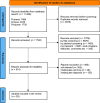Research evidence on the management of the cognitive impairment component of the post-COVID condition: a qualitative systematic review
- PMID: 39328154
- PMCID: PMC11457117
- DOI: 10.1192/j.eurpsy.2024.1770
Research evidence on the management of the cognitive impairment component of the post-COVID condition: a qualitative systematic review
Abstract
Background: Cognitive impairment (CI) is one of the most prevalent and burdensome consequences of COVID-19 infection, which can persist up to months or even years after remission of the infection. Current guidelines on post-COVID CI are based on available knowledge on treatments used for improving CI in other conditions. The current review aims to provide an updated overview of the existing evidence on the efficacy of treatments for post-COVID CI.
Methods: A systematic literature search was conducted for studies published up to December 2023 using three databases (PubMed-Scopus-ProQuest). Controlled and noncontrolled trials, cohort studies, case series, and reports testing interventions on subjects with CI following COVID-19 infection were included.
Results: After screening 7790 articles, 29 studies were included. Multidisciplinary approaches, particularly those combining cognitive remediation interventions, physical exercise, and dietary and sleep support, may improve CI and address the different needs of individuals with post-COVID-19 condition. Cognitive remediation interventions can provide a safe, cost-effective option and may be tailored to deficits in specific cognitive domains. Noninvasive brain stimulation techniques and hyperbaric oxygen therapy showed mixed and preliminary results. Evidence for other interventions, including pharmacological ones, remains sparse. Challenges in interpreting existing evidence include heterogeneity in study designs, assessment tools, and recruitment criteria; lack of long-term follow-up; and under-characterization of samples in relation to confounding factors.
Conclusions: Further research, grounded on shared definitions of the post-COVID condition and on the accurate assessment of COVID-related CI, in well-defined study samples and with longer follow-ups, is crucial to address this significant unmet need.
Keywords: COVID-19; cognitive impairment; long COVID; rehabilitation; treatment.
Conflict of interest statement
Giulia Maria Giordano reports consulting fees from Angelini. Armida Mucci reports consulting fees from Pierre Fabre, Rovi, and Boehringer Ingelheim; patents with Pierre Fabre; and participation on data safety monitoring boards with Angelini and Boehringer Ingelheim. Silvana Galderisi reports consulting fees from Gedeon Richter; honoraria from Angelini, Boehringer Ingelheim, Gedeon Richter, Janssen, Lundbeck, Otsuka, Recordati, and Rovi; and participation on data safety monitoring boards with Angelini, Boehringer Ingelheim, Janssen, and Rovi. No other competing interests were declared.
References
-
- World Health Organization (WHO). WHO coronavirus (COVID-19)dashboard, https://data.who.int/dashboards/covid19/cases?n=c; 2024. [accessed 9 January 2024].
-
- Ten Have M, Tuithof M, van Dorsselaer S, Schouten F, Luik AI, de Graaf R. Prevalence and trends of common mental disorders from 2007-2009 to 2019-2022: Results from the Netherlands mental health survey and incidence studies (NEMESIS), including comparison of prevalence rates before vs. during the COVID-19 pandemic. World Psychiatry. 2023;22(2):275–85. doi:10.1002/wps.21087. - DOI - PMC - PubMed
-
- Fernandez-de-Las-Peñas C, Notarte KI, Macasaet R, Velasco JV, Catahay JA, Ver AT, et al. Persistence of post-COVID symptoms in the general population two years after SARS-CoV-2 infection: a systematic review and meta-analysis. J Infect. 2024;88(2):77–88. doi:10.1016/j.jinf.2023.12.004. - DOI - PubMed
-
- Galderisi S, Perrottelli A, Giuliani L, Pisaturo MA, Monteleone P, Pagliano P, et al. Cognitive impairment after recovery from COVID-19: frequency, profile, and relationships with clinical and laboratory indices. Eur Neuropsychopharmacol. 2024;79:22–31. doi:10.1016/j.euroneuro.2023.11.001. - DOI - PubMed
Publication types
MeSH terms
LinkOut - more resources
Full Text Sources
Medical


